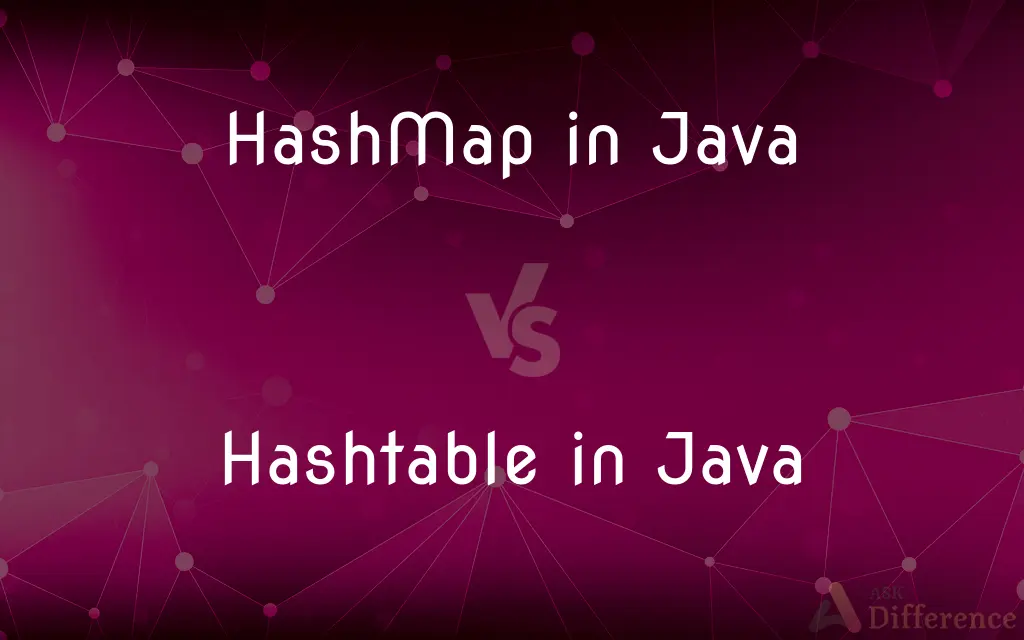HashMap in Java vs. Hashtable in Java — What's the Difference?
By Tayyaba Rehman & Urooj Arif — Published on February 5, 2024
HashMap in Java allows null values/keys, is unsynchronized, and iterates faster, while Hashtable is synchronized, doesn’t permit nulls, and is a legacy class.

Difference Between HashMap in Java and Hashtable in Java
Table of Contents
ADVERTISEMENT
Key Differences
HashMap in Java is a part of the java.util package, offering a map that doesn't maintain any order. Hashtable, also a map, is from the same package but is a legacy class from an earlier version of Java.
In HashMap, null values and one null key are allowed, making it more flexible. Hashtable, on the other hand, doesn't allow any null key or null value, throwing a NullPointerException.
HashMap is unsynchronized, meaning it's not thread-safe and should be synchronized externally if used in a multi-threaded environment. Hashtable is synchronized, making it thread-safe, but this leads to poorer performance in single-threaded scenarios.
Iteration in a HashMap is generally faster compared to a Hashtable due to its unsynchronized nature. Hashtable’s synchronized characteristic slows down its iteration process.
HashMap is more commonly used in newer Java applications due to its efficiency and flexibility. Hashtable, while still used, is considered outdated and less efficient for most modern use cases.
ADVERTISEMENT
Comparison Chart
Null Acceptance
Allows one null key and multiple null values
Does not allow null keys or values
Synchronization
Unsynchronized, not thread-safe
Synchronized, thread-safe
Performance
Generally faster, especially in single-threaded contexts
Slower due to synchronization
Iteration Speed
Faster iteration
Slower iteration due to synchronization
Use in Modern Java
More commonly used in modern applications
Considered legacy, less used in modern Java
Compare with Definitions
HashMap in Java
Unsynchronized, suitable for non-threaded applications.
For our single-threaded app, we chose HashMap for better performance.
Hashtable in Java
Part of the legacy classes in Java’s collection framework.
Our legacy system uses Hashtable as part of its core functionality.
HashMap in Java
Does not maintain any order of its entries.
The HashMap did not maintain the order of entries, which was not required for our logic.
Hashtable in Java
Slower in performance due to its synchronized nature.
Despite its slower performance, we preferred Hashtable for thread safety.
HashMap in Java
Offers faster iterations in non-synchronized contexts.
Iterating through the HashMap improved the function's efficiency.
Hashtable in Java
Ensures thread safety at the expense of single-thread performance.
The application's thread safety was ensured by using Hashtable, even though it reduced performance.
HashMap in Java
A map-based collection allowing null values and keys.
I used a HashMap to store user preferences with some keys being null.
Hashtable in Java
A synchronized key-value pair collection that disallows nulls.
We used a Hashtable for thread-safe operations, ensuring no nulls were entered.
HashMap in Java
Part of the java.util package, used for storing key-value pairs.
We stored the key-value pairs of product details in a HashMap.
Hashtable in Java
Suitable for multi-threaded Java applications due to synchronization.
In our multi-threaded environment, we chose Hashtable for data safety.
Common Curiosities
What is a Hashtable in Java?
A synchronized key-value pair collection that doesn't allow null elements.
Is Hashtable synchronized?
Yes, Hashtable is synchronized and thus thread-safe.
Can HashMap hold null values?
Yes, HashMap can hold one null key and multiple null values.
What is a HashMap in Java?
A collection class that stores elements in key-value pairs, allowing null values.
Should I use HashMap in multi-threaded applications?
In multi-threaded applications, external synchronization is needed for HashMap.
Can Hashtable accept null keys or values?
No, Hashtable cannot accept any null key or value.
Which is more modern, HashMap or Hashtable?
HashMap is more modern and commonly used in recent Java applications.
Can I use a Hashtable in a single-threaded application?
Yes, but it's less efficient due to its synchronized nature.
Which is faster, HashMap or Hashtable?
HashMap is generally faster, especially in single-threaded scenarios.
Is Hashtable still used in modern Java?
It's less used due to being a legacy class, with HashMap often preferred.
How do I make a HashMap thread-safe?
Wrap it with Collections.synchronizedMap to make it thread-safe.
Does HashMap maintain the order of elements?
No, HashMap does not maintain any order of its elements.
How does the iteration speed compare between HashMap and Hashtable?
HashMap typically offers faster iteration than Hashtable.
Are both HashMap and Hashtable part of java.util package?
Yes, both are part of the java.util package.
Are HashMap and Hashtable interchangeable?
They are not directly interchangeable due to differences in null handling and synchronization.
Share Your Discovery

Previous Comparison
Convection Oven vs. Toaster Oven
Next Comparison
Christian vs. Seventh Day AdventistAuthor Spotlight
Written by
Tayyaba RehmanTayyaba Rehman is a distinguished writer, currently serving as a primary contributor to askdifference.com. As a researcher in semantics and etymology, Tayyaba's passion for the complexity of languages and their distinctions has found a perfect home on the platform. Tayyaba delves into the intricacies of language, distinguishing between commonly confused words and phrases, thereby providing clarity for readers worldwide.
Co-written by
Urooj ArifUrooj is a skilled content writer at Ask Difference, known for her exceptional ability to simplify complex topics into engaging and informative content. With a passion for research and a flair for clear, concise writing, she consistently delivers articles that resonate with our diverse audience.
















































